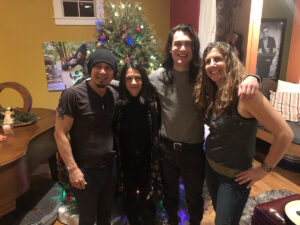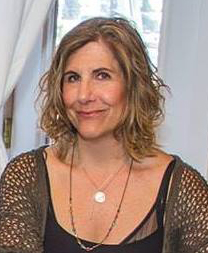I guess it’s no surprise that I’ve been thinking a lot about the holidays — it’s hard to escape this time of year.
For some odd reason, I love this season which is curious because it was very stressful for me growing up. We celebrated Christmas even though we were Jewish (according to Jewish law). Both of my grandmothers were Jewish, but my mom had a very strong and personal connection to Jesus so Christmas was important to her. We had pizza for dinner on Christmas Eve and bagels, lox and cream cheese on Christmas morning with my grandparents. There were definitely some happy holiday memories for me but those were mostly when I was too young to see beyond the lights and presents. As I got older, Christmas started to feel dangerous to me. My parents struggled financially because my dad was in sales and his income fluctuated. He was our sole provider because my mom — who lived with schizophrenia, bi-polar disorder and addiction — was unable to work. On top of a single family income, my dad faced massive debt from emergency room visits, inpatient psychiatric care, expensive antipsychotic medications and my mom’s excessive binge shopping sprees. The holidays were challenging because they added a lot of financial stress and guilt, not to mention an extra abundance of alcohol, which often led to violent outbursts.
 I was 20-years-old when I first attended Christmas with my future husband’s extended family. I believe that it helped me reframe my feelings about the holidays. Christmas with them was (and still is) a full-on cacophony of merriment. I can conjure up the tastes and smells just thinking about it…calabasitas, tamales, fried wontons, shumai and Mexican wedding cookies just to name a few. I can still hear the carols — “Silent Night” followed by the Spanish version, “Noche de Paz”, which was led by the family matriarch Mama Toñia. It was a celebration so vibrant and festive — a welcome contrast to my low-key, volatile childhood holiday experiences. When Mark and I got married and had our own kids, I was able to completely redefine Christmas on my own terms. This was very empowering. We snuggled into a nice cozy blend of festive and sweet. Spending Christmas Eve with his larger family and Christmas day at home cooking, eating and playing. And yes, we would have my family over for bagels, lox and cream cheese in the morning.
I was 20-years-old when I first attended Christmas with my future husband’s extended family. I believe that it helped me reframe my feelings about the holidays. Christmas with them was (and still is) a full-on cacophony of merriment. I can conjure up the tastes and smells just thinking about it…calabasitas, tamales, fried wontons, shumai and Mexican wedding cookies just to name a few. I can still hear the carols — “Silent Night” followed by the Spanish version, “Noche de Paz”, which was led by the family matriarch Mama Toñia. It was a celebration so vibrant and festive — a welcome contrast to my low-key, volatile childhood holiday experiences. When Mark and I got married and had our own kids, I was able to completely redefine Christmas on my own terms. This was very empowering. We snuggled into a nice cozy blend of festive and sweet. Spending Christmas Eve with his larger family and Christmas day at home cooking, eating and playing. And yes, we would have my family over for bagels, lox and cream cheese in the morning.
What the season means to me now has nothing to do with religion. It’s an excuse to decorate with little white lights and to get my adult kids home and cooking in the kitchen with us. My kids prefer time together instead of presents. We skip the traditional ham or turkey and make Tapas (each of us prepares and serves a small bite). Sometimes we play light up bocce ball outside at night or shoot pool at a local bar on Christmas eve.
I still love this time of year and I also recognize how lucky I am to have side-stepped some of my personal baggage and reframe the holidays in a way that feels emotionally healthy to me. If the holidays feel challenging to you, think about how you might add a few activities that bring you joy and chip away at least a few of the things that bring you down.
Things to consider as we support each other through the season in Central Oregon…
While the season is intended to bring families and friends together to share food and traditions, it can be a difficult time for many.
- For those of us who don’t have loved ones nearby, it can be lonely.
- For those of us who have strained family relationships, it can be painful.
- For those of us who are not of the Christian faith and/or don’t celebrate Christmas, it can be uncomfortable.
1. When we’re alone for the holidays…
The emphasis on family during the holidays can be trying for many who are not able to gather for various reasons. Here are a few ideas to help us mind our minds and make the season a little less lonely.
Verywellmind: How to Cope When You Are Alone on Christmas
Prevention Magazine: 9 Ways To Survive The Holidays When You’re Alone
PsychCentral: 10 Things to do if you’re alone for the holidays
2. When family time is challenging…
We often romanticize holiday family time or go in with high expectations and then feel disappointed when things don’t turn out the way we hoped. It’s important to mind our minds before, during and after the holiday season. Here’s a great article from Stanford’s employee Bewell program that has some very specific tips: Surviving the Family Holiday. Also, check out National Public Radio’s Holiday Survival Guide: Family Style…
3. When we don’t celebrate Christmas…
What does it mean to be sensitive to our neighbors who don’t celebrate Christmas? Sometimes, a well-intended “Merry Christmas” can conjure up a range of feelings from awkwardness to isolation and exclusion. Central Oregon is slowly becoming more diverse and in the spirit of peace on earth and goodwill, we can all find ways to be more inclusive and honor each other’s beliefs and traditions. Check out mom.com’s 17 Ways to Celebrate a More Inclusive Christmas for some interesting ideas to consider.
Here’s one more article from NPR you might like: Holiday Parties Make You Squirm? Here’s How To Conquer Social Anxiety
I wish you all a wonderful, inclusive and mindful holiday season!
 Linda Quon is Vice President and Director of Communication at Quon Design and Communication. Linda is working to promote everyday mental health awareness in partnership with Deschutes County Health Services and Central Oregon Health Council — which includes providers and health advocates from Crook, Jefferson, and Deschutes Counties. Linda was born and raised in Southern California and moved to Central Oregon with her husband and two children in 2005. Her mother lived with Schizophrenia and bi-polar disorder and her oldest brother also experienced bi-polar disorder. With support from family, friends, therapists and primary care providers, Linda has been navigating the world of mental illness most of her life — including her own struggles with mild anxiety and depression. Linda is proud to work as an advocate for mental health and a blogger for Mind Your Mind Central Oregon.
Linda Quon is Vice President and Director of Communication at Quon Design and Communication. Linda is working to promote everyday mental health awareness in partnership with Deschutes County Health Services and Central Oregon Health Council — which includes providers and health advocates from Crook, Jefferson, and Deschutes Counties. Linda was born and raised in Southern California and moved to Central Oregon with her husband and two children in 2005. Her mother lived with Schizophrenia and bi-polar disorder and her oldest brother also experienced bi-polar disorder. With support from family, friends, therapists and primary care providers, Linda has been navigating the world of mental illness most of her life — including her own struggles with mild anxiety and depression. Linda is proud to work as an advocate for mental health and a blogger for Mind Your Mind Central Oregon.
